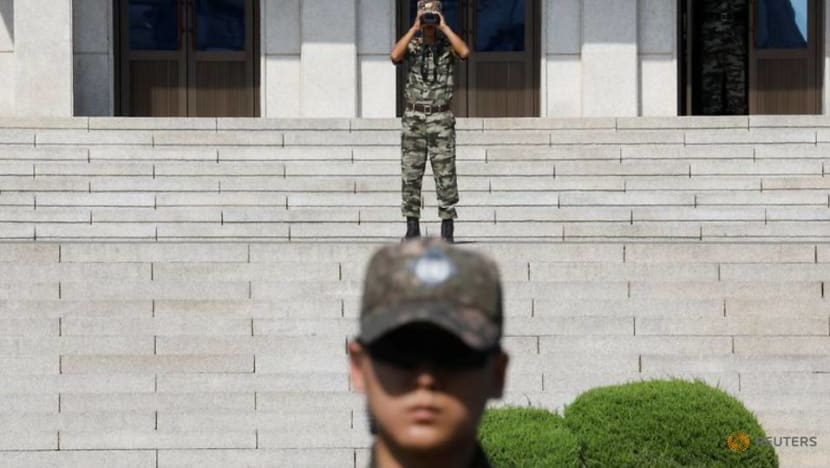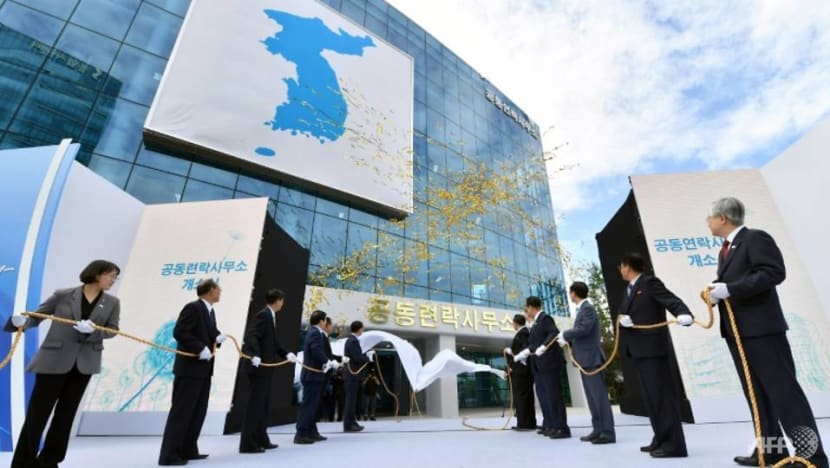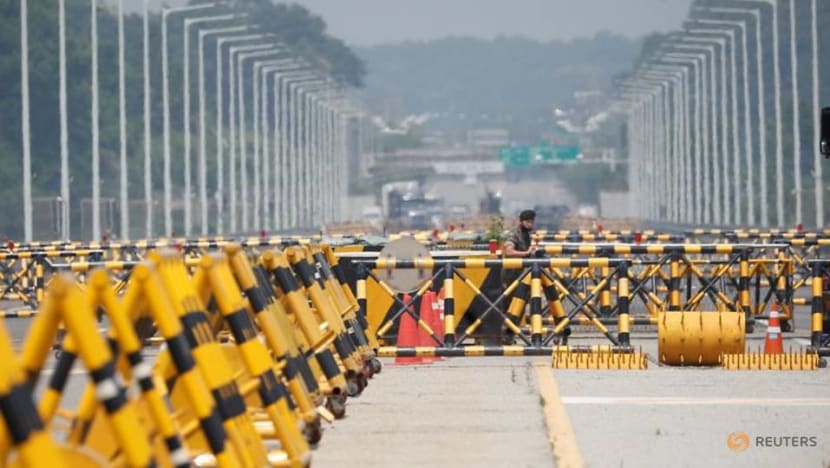commentary Commentary
Commentary: Is North Korea tearing at the seams?
North Korea is currently facing two major, inter-related crises that is underpinning its frustrations with South Korea, says Steven Borowiec.

A North Korean soldier looks toward the south as a South Korean soldier stands guard in the truce village of Panmunjom inside the demilitarized zone (DMZ) separating the two Koreas, South Korea, August 28, 2019. REUTERS/Kim Hong-Ji/Pool
SEOUL: By detonating a bomb to destroy the inter-Korean liaison office in its territory on Tuesday (Jun 16), North Korea sent a clear message: Pyongyang is done talking.
The office was set up in 2018 as a forum for communication between South and North Korea that would allow the two sides to harness momentum created by summit meetings between their leaders.
At the office, government officials would be able to meet away from the spotlight to do the real work of policymaking, hammering out agreements for cooperation between the two sides.
READ: Commentary: North Korea is frustrated we are not taking it seriously
But that cooperation never got off the ground and by the time North Korea reduced the building to rubble on Tuesday, the office had been idle for months, due to precautions over the novel coronavirus, and a lack of momentum in inter-Korean ties.
LONGSTANDING FRUSTRATION
The explosion is the most decisive action North Korea has taken in a string of moves that indicated that Pyongyang no longer wishes to keep up friendly ties with the South.
For months, North Korea has ignored the South’s calls to move forward on cooperative projects, and last week, Kim Yo Jong, the younger sister of leader Kim Jong Un, declared that the North would now approach the South as an “enemy.”
To understand North Korea’s decision to literally destroy its relationship with the South, it is important to note current developments in the North, and longstanding themes in how the Kim regime operates.

First, North Korea is currently facing two major, inter-related crises.
On one hand, comprehensive international sanctions are making it nearly impossible for the country to carry out any international trade. These sanctions, mostly implemented by the United Nations (UN), are intended to make it impossible for the state to earn money to fund its weapons programmes.
But, unlike targeted sanctions, the measures affect all North Koreans, not only people connected to government or the military. This means that North Korean coal and seafood companies cannot export their goods and that farmers can’t import the fuel and equipment they need.
International observers have therefore reported signs of severe food shortages in the North, with the UN World Food Programme recently estimating that 10 million North Koreans are in need of humanitarian aid.
PYONGYANG’S OLD PLAYBOOK
On the other hand, the global coronavirus pandemic has compounded the country’s economic problems. While North Korea has not admitted to having even one confirmed case of the virus, the country closed its border with China in January, thereby severing its one active link with the outside world.

There are also signs that the North is allocating its increasingly scarce state funds to expanding its medical care capacity, either to brace for an eventual coronavirus outbreak, or deal with one that is already ongoing.
With nearly all North Koreans feeling the effects of the trying times, North Korea is resorting to its old playbook and coming up with a crisis to distract the public.
READ: Commentary: North Korea may have benefited from the pandemic after all
To draw attention away from their own shortcomings, North Korea’s leaders have for decades pushed stories that the country must unite against malevolent outsiders who wish ill on the country.
In this instance, North Korea has targeted groups of activists, some of whom are North Korean defectors, who fly balloons carrying leaflets that contain anti-North Korean messages across the border.
The groups argue that the launches provide North Koreans with access to accurate information about their country, specifically how the leadership spends millions on weapons and luxury goods while most North Koreans live in poverty.
The launches have been going on for years, and while North Korea has complained about them, and even tried to shoot balloons out of the air, this week’s actions are by far the most severe reaction to them.
TIES WITH US AND SOUTH KOREA
At the root of North Korea’s frustration is the regime’s failure to win sanctions relief through negotiations with South Korea and the United States.
In summits over the past few years, both Seoul and Washington have been careful not to yield on sanctions in the absence of credible moves toward denuclearisation by North Korea.
READ: Commentary: COVID-19 is stressing North Korea out
READ: Commentary: Imagine a North Korea without Kim Jong Un. Here’s why you can’t
North Korea seemed to approach those summits with the ambition of winning sanctions relief without giving up its nuclear weapons. Pyongyang appears at the moment to be focussing criticism on the South so as to leave open the door for possible negotiations with the US.
Another source of vexation for Pyongyang is South Korean President Moon Jae-in’s administration insisting on operating within the strictures of sanctions, and not embarking on any projects that violate sanctions on North Korea.

South Korea keeps offering up projects, such as excavating Korean War remains from the demilitarised zone and reconnecting railroads, which are uninteresting to the North because, while heavy on symbolism, they do nothing to enliven the North’s moribund economy.
The early indications are that South Korea will not be bullied, and that the destruction of the liaison office will not force Moon’s hand toward a major policy shift. South Korea responded to Tuesday’s incident with vows to respond forcefully if further provoked.
READ: Commentary: How is North Korea laundering money – and getting away with it?
READ: Commentary: North Korea has been trolling us all this while
Like all global leaders, Moon is currently focussed on reining in the coronavirus pandemic while limiting the economic fallout. Tensions with North Korea will do little to affect him in the here and now.
Having in April won a decisive majority in the legislature, Moon is operating from a position of strength for the rest of his term, and a lack of progress with North Korea will do little to undermine his approval rating.
North Korea has alluded to possibly carrying out a military action against the South, and on Wednesday (Jun 17) announced the redeployment of troops to two areas in its territory that had previously been sites of business cooperation with the South.
The redeployment is mostly symbolic, a way of showing the South that cooperation is over and discord is back.
In announcing the decision to explode the liaison office, North Korea claimed to be acting on behalf of the country’s “enraged people,” saying that regular North Koreans were so angered by the balloon launches that the state had to take action.
Unfortunately, because the country is a state cut off from the world, we have no way of knowing how regular North Koreans really feel.
We are instead left with the sad realisation that by walking away from rapprochement with the South, North Korea has again chosen antagonism over peace.
Steven Borowiec is the politics editor of Korea Expose.














